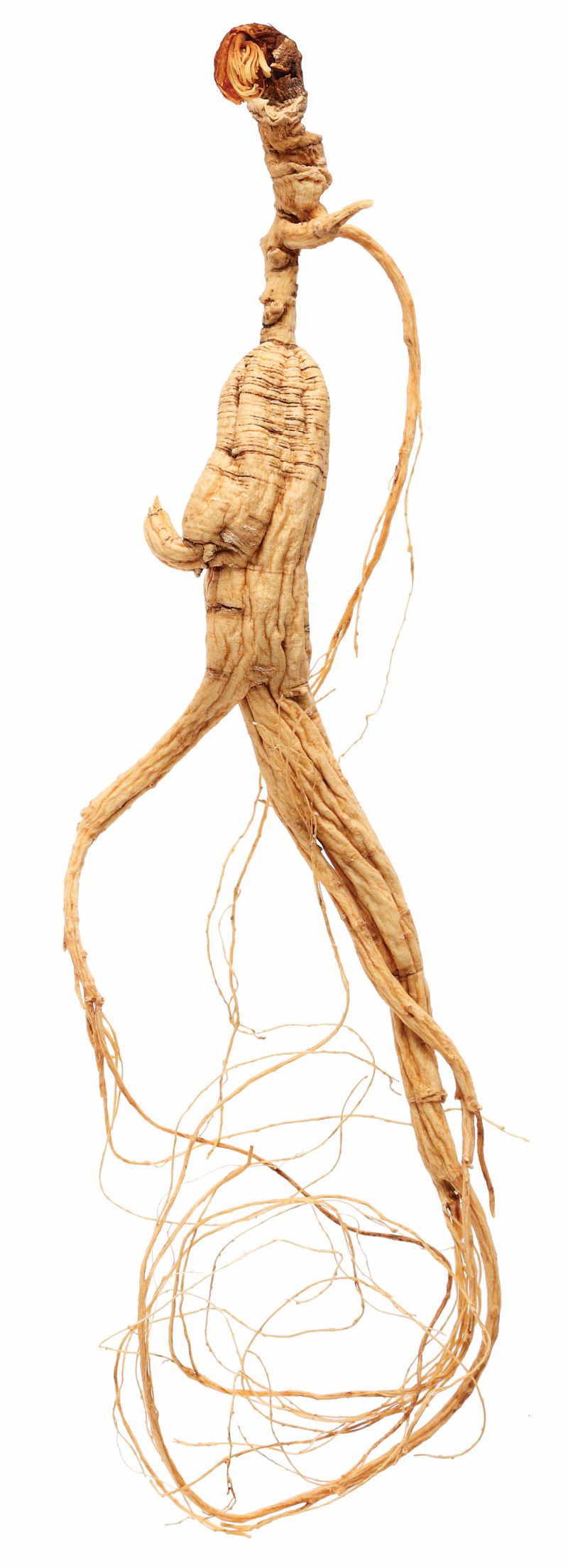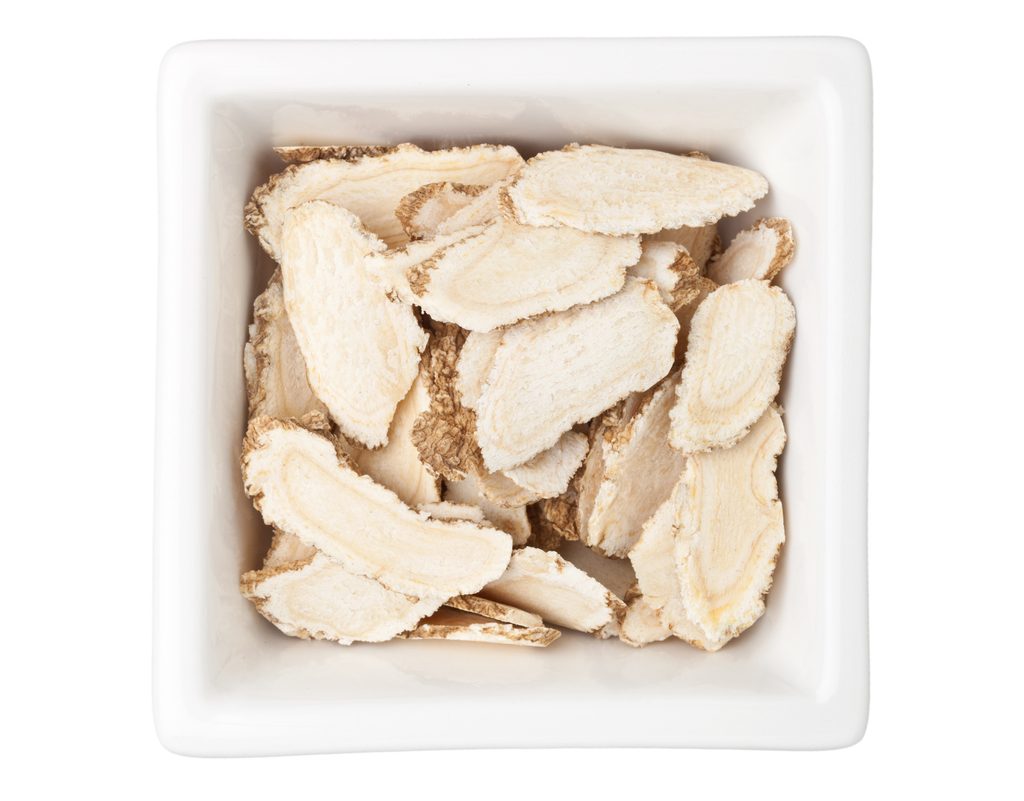Ginseng

What is Ginseng?
Ginseng (ren shen, 人参), one of the world’s oldest and famous herbs, is a powerful adaptogenic herb. Chinese Taoists believed that Ginseng has the strongest ability to absorb strength from the Earth, making it The King Herb for tonifying qi.
In the 2000-year-old Traditional Chinese Medicine (TCM) Compendium of Materia Medica, it was said that “Ginseng is a tonic to the five viscera, quieting animal spirits, stabilizing the soul, preventing fear, expelling the vicious energies, brightening the eye and improving vision, opening the heart benefiting the understanding, and if taken for some time will invigorate the body and prolong life.”
In Chinese, ren means human and shen means the roots of a plant, referring to the characteristic shape of Ginseng root which resemble the legs of a human.
In TCM, Ginseng falls under the category of ‘Tonic herbs for Qi Deficiency’. It can replenish one’s ‘Four Treasures’ (qi, blood, yin and yang). Warm in nature, Ginseng helps individuals with too much ‘Cold’ in their body, such as those who have a Yin Excess or a Yang Deficiency, to restore a healthy yin-yang balance.
Bitter and sweet, Ginseng cleanses the body by clearing Heat, drying Dampness and promoting elimination via urination or bowel movements. It can also slow down acute reactions, detoxify the body and has a tonic effect on the body. In particular, Ginseng targets the Heart, the Lungs and the Spleen.
Functions and Benefits of Ginseng
Traditional Chinese Medicine (TCM) shows that Ginseng include the following health benefits:
Ginseng can intensely tonify one’s qi and blood to boost vitality and treat chronic illnesses that have compromised one’s qi. In particular, Ginseng can address an extreme collapse of qi, shortness of breath, weak pulse, cold limbs, prolapse, anxiety, forgetfulness and insomnia. In other words, Ginseng can refortify the system by replenishing one’s qi and blood.
Also, Ginseng can strengthen the Heart and the stomach to treat conditions such as anorexia, diarrhea and bloating. Ginseng can nourish one’s yin to promote the secretion of body fluids such as saliva to relieve thirst too. In addition, Ginseng is effective in calming one’s shen (mind) to induce sedation.
Modern studies have also shown that Ginseng may help to alleviate symptoms of heart diseases among patients. Frequent consumption of the herb may even reduce the amount of bad cholesterol and, in turn, raise the good cholesterol in your body. Ginseng has also been reported to boost the immune system by maintaining its homeostasis, and improve one’s energy levels.
Ginseng may also have some effect on blood sugar levels, such as helping to regulate blood glucose levels in people with Type 2 diabetes to fight it. Aside from the above mentioned Ginseng benefits, Ginseng can also improve skin health by brightening the skin, preventing ultraviolet (UV) damage, enhancing collagen synthesis and diminishing signs of ageing.
Rich in antioxidants, Ginseng may inhibit inflammation and reduce oxidative damage to cells, which help to prevent chronic diseases. Ginseng can also improve brain functions like memory. According to one review, Ginseng can even help to ease stress and offer relief for depression and anxiety.
Some research suggests that Ginseng may be useful in treating erectile dysfunction too.

How to Use Ginseng
For optimum potency, Ginseng should only be harvested when it is at least four years old, but it is in its best condition when it is seven years old and above. The recommended dosage is 1 – 2g for raw Ginseng root, and 200 – 400mg for Ginseng extract.
It is best to start with lower doses, and the exact dosage is dependent on the condition you want to improve. We encourage you to consult your healthcare provider to find out how much Ginseng is suitable for your body’s condition.
Ginseng can be consumed in many ways, you can eat it raw, or you can steam it lightly before consuming. Also, Ginseng can be stewed in water to brew a cup of Ginseng tea, or it can be added to various recipes such as soups and stir-fried dishes. Ginseng can also be used to make beverages. Additionally, Ginseng comes in forms such as powder, tablets, capsules and oil forms.

Cautions and Side Effects of Ginseng
Ginseng should not be used by those who have Yin Deficiency with Heat signs, or by those with Excess Heat. This herb should also be avoided by individuals who have acute pathogenic conditions or high blood pressure.
Individuals who are taking medications for diabetes need to monitor their blood sugar levels closely in order to make sure that their blood sugar levels do not go too low. Additionally, Ginseng may reduce the effectiveness of anticoagulant drugs.
There is evidence that extended use of Ginseng could compromise its effectiveness in the body. To maximise the herb’s benefits, it is suggested that you can take Ginseng in cycles of two to three weeks with a one or two week break in between.
Some reported side effects of Ginseng are nervousness, insomnia, headaches, dizziness, and upset stomach. Regular usage of Ginseng may also cause menstrual changes.
We strongly advise you to consult your healthcare provider before adding Ginseng to your healthcare routine!
Summary
Here is a summary for Ginseng:
- Herb name (Chinese): 人参
- Herb name (Pin Yin): rén shēn
- Herb name (English): Ginseng
- Herb name (Botanical): Radix et Rhizoma Ginseng
- Origin of species: Panax ginseng C. A. Mey.
- Part(s) of herb used: Root and rhizome
- Geo-specific habitat(s): Jilin, Liaoning, Heilongjiang
- Taste(s) & Properties: Sweet, slightly bitter; Slightly warm; Administrates the Spleen, Lung, Heart and Kidney Meridians
- Actions: Nourishes and strengthens the bodily functions; Improves overall vitality; Eases constant thirst due to chronic illnesses; Helps calm the mind and improve sleep
References
Mohamad, H. S., Wenli, S., & Qi, C. (2019). A review of ginseng species in different regions as a multipurpose herb in traditional Chinese medicine, modern herbology and pharmacological science. Journal of Medicinal Plants Research, 13(10), 213-226. [Accessed on 28th October 2022]
Shahrajabian, M. H., Sun, W., & Cheng, Q. (2019). The power of natural Chinese medicine, ginger and ginseng root in an organic life. Middle-East Journal of Scientific Research, 27(1), 64-71.[Accessed on 28th October 2022]
Xiang, Y. Z., Shang, H. C., Gao, X. M., & Zhang, B. L. (2008). A comparison of the ancient use of ginseng in traditional Chinese medicine with modern pharmacological experiments and clinical trials. Phytotherapy Research, 22(7), 851-858.[Accessed on 28th October 2022]
Share this article on
